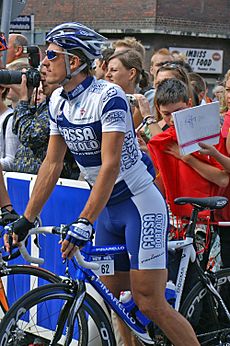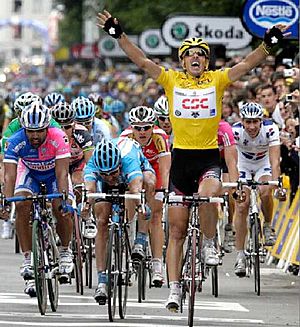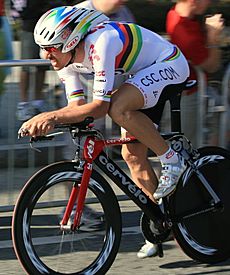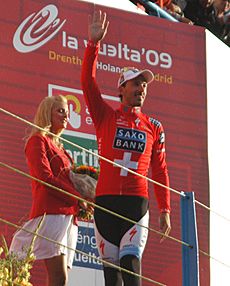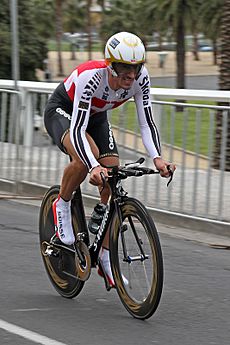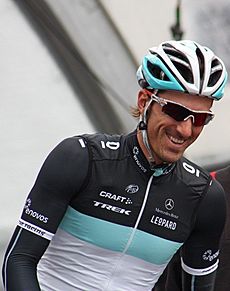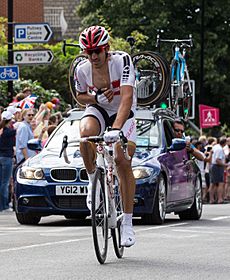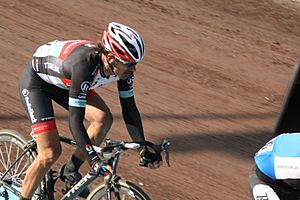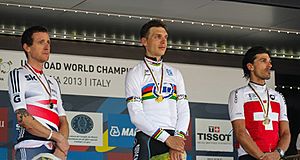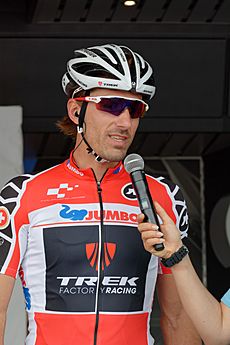Fabian Cancellara facts for kids
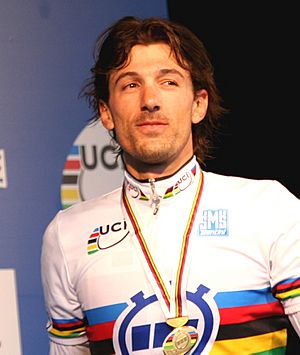
Cancellara at the 2010 UCI Road World Championships
|
|||
| Personal information | |||
|---|---|---|---|
| Full name | Fabian Cancellara | ||
| Nickname | Spartacus | ||
| Born | 18 March 1981 Wohlen bei Bern, Switzerland |
||
| Height | 1.86 m (6 ft 1 in) | ||
| Weight | 78 kg (172 lb; 12 st 4 lb) | ||
| Team information | |||
| Current team | Retired | ||
| Discipline | Road | ||
| Role | Rider | ||
| Rider type | Time trialist Classics specialist |
||
| Major wins | |||
|
|||
Fabian Cancellara (born March 18, 1981) is a retired Swiss professional road racing cyclist. He was known as "Spartacus" for his strength and powerful riding style. Fabian was especially good at time trials and one-day classic races. He also helped his teammates who aimed to win big races.
Fabian won two junior world championships in time trials in 1998 and 1999. He became a professional cyclist at age 19. His first big win was at the 2004 Tour de France. He won the opening time trial and wore the famous yellow jersey for a day. In 2006, he won his first World Time Trial Championship and the tough Paris–Roubaix race. He won the world time trial title again in 2007 and two stages at the Tour de France.
In 2008, Fabian won a gold medal at the Summer Olympics in the individual time trial. He also won the Milan–San Remo race. He became world time trial champion again in 2009 and 2010. In 2010, he won both Paris–Roubaix and the Tour of Flanders. After some challenging years, he won the Tour of Flanders and Paris–Roubaix again in 2013. He also won the Tour of Flanders for a third time in 2014.
Fabian Cancellara has won many major races. He won Paris–Roubaix three times, Milan–San Remo once, and the Tour of Flanders three times. He won the opening stage of the Tour de France five times. He wore the yellow jersey for 29 days in total, more than any rider who hasn't won the Tour overall. He also won the overall titles at Tirreno–Adriatico, Tour de Suisse, and Tour of Oman. At the Olympics, he won gold in the individual time trial in 2008 and 2016. He also earned a silver medal in the road race in 2008.
Contents
- Early Life and Junior Cycling Success
- Professional Cycling Journey
- Starting His Career (2000–2002)
- Rising Through the Ranks (2003–2005)
- First Classic Victory (2006)
- Summer and Autumn Success (2007)
- Olympic Champion (2008)
- Time Trial Dominance (2009)
- Many Victories (2010)
- Close Calls (2011)
- Injuries and Comeback (2012)
- Back to Winning (2013)
- Third Tour of Flanders Win (2014)
- Crashes and Injuries (2015)
- Final Season and Olympic Gold (2016)
- Personal Life
- Career Achievements
- See also
Early Life and Junior Cycling Success
Fabian Cancellara was born in Wohlen bei Bern, Switzerland, on March 18, 1981. He found an old family bike in the garage when he was 13. He loved it so much that he stopped playing football to focus on cycling. He was also very good at cross-country skiing when he was younger.
Fabian's cycling talent showed early on. He was especially good at time trials and was the best junior cyclist in Switzerland. His junior national team coach said Fabian was "head and shoulders above everyone else" in time trials. He won the junior World Time Trial Championship in both 1998 and 1999. At 19, he finished second in the Under-23 World Time Trial Championship in 2000.
Professional Cycling Journey
Starting His Career (2000–2002)
After his strong performance in the Under-23 championship, Cancellara became a professional with the Mapei–Quick-Step team. This team was one of the strongest in the world. He joined their "Young Riders Project" in 2001. His first professional win was in the opening time trial of the Tour of Rhodes, which he also won overall.
In 2002, the Mapei team split into two groups. Cancellara joined the "Gruppo Giovani" (youth group) to help young talents grow. During his two years with Mapei, Cancellara used his time trial skills to win several races. He achieved a total of eleven victories.
Rising Through the Ranks (2003–2005)
After his team closed in 2002, Cancellara joined Fassa Bortolo in 2003. He helped his team win a team time trial at the Tour Méditerranéen. On April 6, he rode his first major classic race, the Tour of Flanders. He finished 73rd. He then won a short time trial at the Tour de Romandie and the points classification. He also won a time trial at the Tour of Belgium and the opening time trial of the Tour de Suisse.
In 2004, Cancellara won a stage at the Tour of Qatar. He also won the first stage of the Setmana Catalana de Ciclisme. He rode the Tour of Flanders and finished 42nd. The next weekend, he raced Paris–Roubaix for the second time. He was in the leading group of four riders but finished fourth in the sprint. He then won a time trial at the Tour de Luxembourg. In late June, he won his second Swiss National Time Trial Championship. His biggest success came at the 2004 Tour de France. He won the opening time trial in Liege, Belgium, and wore the yellow jersey. He lost the lead after the second stage. He also competed in the Road World Championships time trial, finishing eighth.
In 2005, Cancellara won a stage at Paris–Nice. He also won the final time trial stage of the Setmana-Catalana. He finished 42nd at the Tour of Flanders and eighth at Paris–Roubaix. He won another time trial at the Tour de Luxembourg. He then won the Swiss National Time Trial Championship for the third time. He rode the Tour de France but didn't win any stages. At the Road World Championships, he won a bronze medal in the time trial.
First Classic Victory (2006)
After his team disbanded, Cancellara joined Team CSC in 2006. His first win with the new team was a time trial stage at the Tirreno–Adriatico. He then raced Milan–San Remo and the E3 Prijs Vlaanderen. He finished sixth at the Tour of Flanders. The next weekend, he rode his final classic race of the season, the Paris–Roubaix. Cancellara attacked and rode solo to win the race. On April 9, he celebrated his first major classic victory.
He then won a time trial stage at the Volta a Catalunya. In late June, he won his third straight Swiss National Time Trial title. He then won two stages and the overall title at the Danmark Rundt. Later that month, he helped his team win the opening team time trial at the Vuelta a España. At the UCI Road World Championships, Cancellara won the men's time trial by over a minute, becoming world champion.
Summer and Autumn Success (2007)
Cancellara had a slow start to the 2007 season. He finished 119th at Milan–San Remo. He came close to winning the E3 Prijs Vlaanderen but was beaten by Tom Boonen. He finished 53rd at the Tour of Flanders and 19th at Paris–Roubaix.
His success began in June. He won the opening and closing time trials at the Tour de Suisse. He also won the Swiss national time trial. Cancellara won the opening time trial of the Tour de France in London. He then won the third stage after a late attack. He wore the yellow jersey until stage seven, the Tour's first mountain stage.
In September, Cancellara returned to the Road World Championships to defend his time trial title. He won the time trial by 52 seconds, becoming world champion again.
Olympic Champion (2008)
Cancellara started 2008 by winning the opening time trial of the Tour of California. He then won the Monte Paschi Eroica race in Italy. He won a time trial stage at the Tirreno–Adriatico, which helped him win the overall race. A few days later, he won the Milan–San Remo classic race. He attacked in the final kilometers to win. At Paris–Roubaix, Cancellara finished second.
He won the opening time trial of the Tour de Luxembourg. He then had great success at the Tour de Suisse, winning two stages and the points classification. Cancellara also helped his teammate Carlos Sastre win the overall title at the Tour de France. He was later awarded a stage win after another rider was disqualified.
At the Olympic Road Race in Beijing, Cancellara won a bronze medal. This medal was later upgraded to silver after another rider was disqualified. Four days later, he won the gold medal in the time trial event. He won by over thirty seconds. For his achievements, Cancellara was named the Swiss Male Athlete of the Year.
Time Trial Dominance (2009)
Cancellara's first win of 2009 was the opening time trial of the Tour of California. He had a challenging start to the season in the early classic races. He did not finish the Tour of Flanders and finished 49th at Paris–Roubaix.
He found success in June at the Tour de Suisse. He won both time trial stages and the overall race. A week later, he won his first Swiss national road racing title. In July, he won the opening stage of the Tour de France and wore the yellow jersey for several days.
Cancellara also won two time trial stages at the Vuelta a España and wore the race leader's jersey. The Road World Championships were held in Switzerland, Cancellara's home country. He won the time trial by a large margin. This was his third world championship in the time trial, tying the record. He finished fifth in the road race.
Many Victories (2010)
Fabian Cancellara started 2010 by winning the overall title at the Tour of Oman. In late March, he won the E3 Prijs Vlaanderen. On April 4, he raced the famous Tour of Flanders. He attacked and rode solo to victory. By winning, he became one of only a few cyclists to win three major cycling "monuments" in his career.
A week after his Tour of Flanders win, Cancellara raced the Paris–Roubaix. He attacked with more than 50 km to go and rode solo to the finish, winning by two minutes. He then won the opening time trial of the Tour de Suisse. Next, Cancellara won the opening time trial of the Tour de France and wore the yellow jersey. Later in the Tour, he won another individual time trial stage.
At the Road World Championships, Cancellara defended his title as world champion in the time trial. He won the time trial by over a minute. This made him the first man to win the time trial world championship four times.
Bike Allegations
In 2010, there were claims that Fabian Cancellara might have used a hidden motor in his bike during his wins at the Tour of Flanders and Paris–Roubaix. A former cyclist showed a video suggesting how a small motor could be hidden. However, cycling officials stated that there was no evidence against Cancellara. Cancellara himself said the claims were "stupid" and that he had "never had batteries on [his] bike."
Close Calls (2011)
In 2011, Cancellara joined a new team, Leopard Trek. He won the final time trial stage of the Tirreno–Adriatico. He finished second at Milan–San Remo in a sprint finish.
Cancellara was a top favorite for the spring classic races. He won the E3 Prijs Vlaanderen–Harelbeke after a solo attack. The next weekend, he finished third at the Tour of Flanders. He then finished second at Paris–Roubaix.
In June, Cancellara won the opening time trial of the Tour de Luxembourg. He also won the opening and closing time trials of the Tour de Suisse. He then won his second Swiss National Road Race title.
Cancellara rode the Tour de France and the Vuelta a España. He helped his team win the opening team time trial at the Vuelta. At the Road World Championships, he finished third in the time trial. He also finished fourth in the road race.
Injuries and Comeback (2012)
In early 2012, Cancellara showed good form. He won the Strade Bianche and a time trial stage at the Tirreno–Adriatico. He was very strong at Milan–San Remo but finished second in the sprint. He was a favorite for the Belgian spring classics. However, a crash at the Tour of Flanders caused him to break his collarbone. This injury ended his spring racing season.
He returned to racing in June at the Tour de Suisse. He finished second in the opening time trial. At the Tour de France, Cancellara won the opening time trial in Liège. This was his fifth such victory in the Tour. He wore the yellow jersey for five days. He left the Tour early to be with his wife for the birth of their second child.
Cancellara then competed in the road race at the Olympic Games. He crashed during the race but finished. He later found out he had no new fractures. Two days later, he raced the Olympic Time Trial but finished seventh. He ended his 2012 season early due to his collarbone injury.
Back to Winning (2013)
Cancellara started 2013 without any wins in the early races. He finished fourth at the Strade Bianche. He came close to winning a time trial stage at the Tirreno–Adriatico. At Milan–San Remo, which had bad weather, he finished third.
His first win of the year was at E3 Harelbeke. He attacked with 35 km left and rode solo to victory. This win made him a top contender for the Tour of Flanders. On the last lap of the Tour of Flanders, Cancellara attacked and rode solo to win his second Tour of Flanders title.
After the Tour of Flanders, Cancellara raced the Scheldeprijs and then the Paris–Roubaix. Despite some crashes, he was still a favorite. At Paris–Roubaix on April 7, Cancellara faced many attacks but countered them all. With about 16 km to go, he made a move that only one other rider could follow. Cancellara then outsprinted him to win his third Paris–Roubaix. He later won the men's time trial at the Swiss Road Championships for the eighth time.
He won a time trial stage at the Tour of Austria. He then won a time trial stage at the Vuelta a España. He also helped his team leader win the overall Vuelta title. At the UCI Road World Championships, Cancellara won a bronze medal in the time trial. He finished tenth in the road race.
Third Tour of Flanders Win (2014)
Fabian Cancellara started 2014 by racing in the Dubai Tour and the Tour of Qatar. He then raced the Strade Bianche, finishing sixth. At the Tirreno–Adriatico, he finished second in a time trial stage.
Next, he raced the Milan–San Remo on March 23. He finished second in a group sprint. Five days later, he competed in the E3 Harelbeke, finishing ninth. Two days later, he raced the Gent–Wevelgem.
A week later, Cancellara raced the Tour of Flanders. He attacked on a climb, and only one other rider could follow. Cancellara then outsprinted three other riders to win his third Tour of Flanders. Four days later, he raced the Paris–Roubaix. He finished third in a sprint from a lead group. In September, Cancellara decided not to compete in the World Championship Time Trial. He focused his energy on the road race instead.
Crashes and Injuries (2015)
Cancellara's 2015 season started well with a stage win at the Tour of Oman. He also won the final time trial stage of the Tirreno–Adriatico. At Milan–San Remo, he finished seventh. The following week, Cancellara crashed badly at E3 Harelbeke. He suffered two small fractures in his lower back. These injuries stopped him from defending his Tour of Flanders title. He returned to racing in late May. At the Tour de Suisse, he finished second and third in the time trials.
At the Tour de France, Cancellara finished third in the opening time trial. On the second stage, he wore the yellow jersey. However, he was involved in a big crash on the third stage. He had to leave the race after finding out he had two more fractures in his lower back.
He restarted racing at the Vuelta a España. However, a stomach illness forced him to leave the race early. This meant he couldn't compete in the world championships. In November 2015, Cancellara announced that he would retire at the end of the 2016 season.
Final Season and Olympic Gold (2016)
In his last professional season, Cancellara started with a win in the Trofeo Serra de Tramuntana in January. Two weeks later, he won a time trial at the Volta ao Algarve. In early March, he won his third Strade Bianche race. Because of his three wins, a section of the race's gravel roads was named in his honor. He then won the final stage of Tirreno–Adriatico.
At the Olympic Games in Rio de Janeiro, Fabian Cancellara won his third Olympic medal. He won gold in the time trial. Fabian Cancellara raced his final professional road race on October 22, 2016.
Personal Life
Fabian Cancellara was born in Wohlen bei Bern, Switzerland. His parents were from southern Italy. He first enjoyed cross-country skiing before focusing on cycling. He married Stefanie in 2006. They had their first daughter, Giuliana, later that year. Their second daughter, Elina, was born on July 13, 2012. The family lives in Bern, Switzerland. Cancellara can speak Italian, French, English, and German fluently.
Career Achievements
See also
 In Spanish: Fabian Cancellara para niños
In Spanish: Fabian Cancellara para niños
 | Selma Burke |
 | Pauline Powell Burns |
 | Frederick J. Brown |
 | Robert Blackburn |


